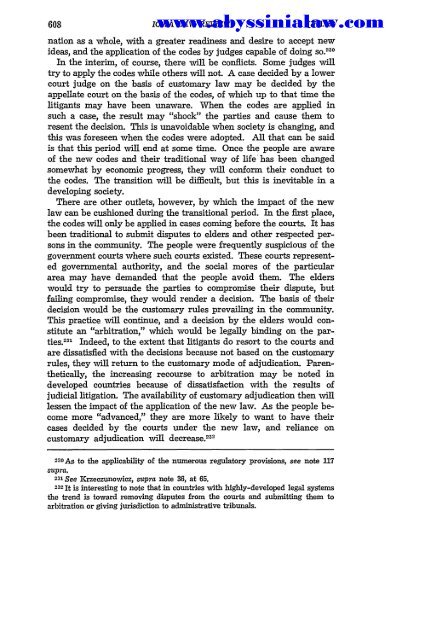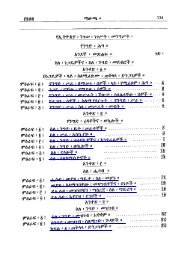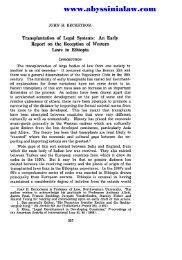Create successful ePaper yourself
Turn your PDF publications into a flip-book with our unique Google optimized e-Paper software.
IOWA LAW REVIEW<br />
nation as a whole, with a greater readiness and desire to accept new<br />
ideas, and the application of the codes by judges capable of doing so. 230<br />
In the interim, of course, there will be conflicts. Some judges wil<br />
try to apply the codes while others will not. A case decided by a lower<br />
court judge on the basis of customary law may be decided by the<br />
appellate court on the basis of the codes, of which up to that time the<br />
litigants may have been unaware. When the codes are applied in<br />
such a case, the result may "shock" the parties and cause them to<br />
resent the decision. This is unavoidable when society is changing, and<br />
this was foreseen when the codes were adopted. All that can be said<br />
is that this period will end at some time. Once the people are aware<br />
of the new codes and their traditional way of life has been changed<br />
somewhat by economic progress, they will conform their conduct to<br />
the codes. The transition will be difficult, but this is inevitable in a<br />
developing society.<br />
There are other outlets, however, by which the impact of the new<br />
law can be cushioned during the transitional period. In the first place,<br />
the codes will only be applied in cases coming before the courts. It has<br />
been traditional to submit disputes to elders and other respected persons<br />
in the community. The people were frequently suspicious of the<br />
government courts where such courts existed. These courts represented<br />
governmental authority, and the social mores of the particular<br />
area may have demanded that the people avoid them. The elders<br />
would try to persuade the parties to compromise their dispute, but<br />
failing compromise, they would render a decision. The basis of their<br />
decision would be the customary rules prevailing in the community.<br />
This practice will continue, and a decision by the elders would constitute<br />
an "arbitration," which would be legally binding on the parties.<br />
231 Indeed, to the extent that litigants do resort to the courts and<br />
are dissatisfied with the decisions because not based on the customary<br />
rules, they will return to the customary mode of adjudication. Parenthetically,<br />
the increasing recourse to arbitration may be noted in<br />
developed countries because of dissatisfaction with the results of<br />
judicial litigation. The availability of customary adjudication then will<br />
lessen the impact of the application of the new law. As the people become<br />
more "advanced," they are more likely to want to have their<br />
cases decided by the courts under the new law, and reliance on<br />
customary adjudication will decrease. 232<br />
www.abyssinialaw.com<br />
[Vol. 53<br />
230 As to the applicability of the numerous regulatory provisions, see note 117<br />
supra.<br />
231 See Krzeczunowicz, supra note 36, at 65.<br />
232 It is interesting to note that in countries with highly-developed legal systems<br />
the trend is toward removing disputes from the courts and submitting them to<br />
arbitration or giving jurisdiction to administrative tribunals.





